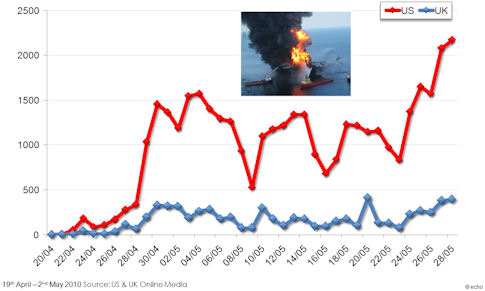Unfortunately for BP, it is so far failing to plug the oil spill, and news of the disaster continues to dominate the headlines, particularly in the US. This is not surprising, considering it faces the immediate impact of the spill, while we in the UK watch from safer shores. PRmoment commissioned research comparing UK and US coverage of the oil spill since the disaster. For both nations, news interest constantly grew since the oil spill began 20 April, but is significantly higher in the US.

Research supplied by Echo Sonar
From the start, President Barack Obama has been vocal about his anger with BP. For example, on 15 May bbc.co.uk reported: “President Barack Obama suggested BP and other firms were trying to duck responsibility, as he condemned a ‘ridiculous spectacle’ of oil executives shifting blame in US congressional hearings.” Mr Obama has emphasised how, he himself, will do as much as he can to limit damage. For example, CNN reported on 2 May: “As concerns about the spill's toll mount – particularly in the commercial fishing industry, a critical $2.4 billion economic engine for the region – Obama promised steps to prevent a similar disaster in the future.”
The spill is obviously terrible news for BP’s business. As cityam.com reported on 4 May: “[BP’s] shares tumbled over 4 per cent as it warned that the battle to get the disaster under control could take three months and that this figure would rise sharply as the oil slick hits land and activity to clean up the environmental disaster gathers pace.”
BP faces an environmental and business disaster, but at least it is succeeding in following basic principles of disaster-management when it comes to PR. Putting out the right messages when the worst happens is no easy task, but it is a task that needs to be tackled head on. David Hart, head of corporate communications and issues management at PR consultancy Fleishman-Hillard, says that the first rule when disaster strikes is to be seen to be in control and to care. Hart says: ”In the past few weeks, a number of disasters have adversely affected the reputation of big business. Whether you are faced with a global news story or an inquisitive call from a local journalist, your response should be the same – prove you are in control and show that you care.”
Hart goes on to describe other main crisis-management tactics: “The biggest communications mistakes are made when companies procrastinate. If your reputation is under threat, you need to hit back fast. Get a senior spokesperson in front of the media as soon as possible to show that the company is in control and being open and transparent. This is where your pre-planned crisis protocols and training come into their own.
“The second biggest charge against a company in a crisis is that it doesn't care. In response to any crisis, you have to remember that the key to quick rehabilitation is to show that you do. This can manifest itself in many forms, but ultimately, it requires the senior spokesperson to say it and show that the company is doing all it can. Showing you care must also extend to your employees. They are your biggest champions. Keep them informed and they will act as such. Ignore them and the rumour mill will gain momentum and ultimately spill into the public domain.”
Bearing in mind the above rules for handling a crisis, how has BP fared? Andy Barr, co-founder of PR agency 10 Yetis, thinks that BP is coping well, but feels that its main problem is on the ground where it is struggling to deliver the solution to the oil spill problem. Barr says: “BP is engaging on every communication platform, giving regular updates and even listing claims filed and already paid which is a great level of transparency.
“The fact that it is not ducking the big interviews and continues to put up its senior management team members for questions shows how seriously it is taking it.”
Barr believes that BP has been more successful at PR than President Obama’s team: “The general view here at 10 Yetis is that it is President Obama and his senior team who are not coming out of it brilliantly by continuing to brief against BP, and also not having one figurehead spokesperson to respond to media questions.
“It is too early to tell how much this will damage BP as a brand, but in the short term it is certainly handling the situation very well from a communications point of view.”
Methodology
PRmoment asked Echo Sonar to analyse online media coverage of the BP oil spill comparing US and UK coverage. The research period was 19 April to 28 May 2010. Metrics included share of voice and volume of coverage of political issues.
PR Masterclass: The Intersection of PR and GEO
Wednesday 25th February, both virtual and in person tickets are available.
PR MasterclassIf you enjoyed this article, sign up for free to our twice weekly editorial alert.
We have six email alerts in total - covering ESG, internal comms, PR jobs and events. Enter your email address below to find out more:








